| Srl | Item |
| 1 |
ID:
132831
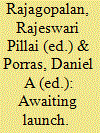

|
|
|
|
|
| Publication |
New Delhi, Observer Research Foundation,
|
| Description |
275p.Pbk
|
|
|
|
|
|
|
|
|
|
|
|
Copies: C:1/I:0,R:0,Q:0
Circulation
| Accession# | Call# | Current Location | Status | Policy | Location |
| 057859 | 358.8/RAJ 057859 | Main | On Shelf | General | |
|
|
|
|
| 2 |
ID:
016268
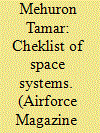

|
|
|
|
|
| Publication |
Aug 1993.
|
| Description |
51-54
|
|
|
|
|
|
|
|
|
|
|
|
|
|
|
|
| 3 |
ID:
118149
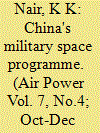

|
|
|
| 4 |
ID:
159307
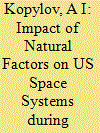

|
|
|
|
|
| Summary/Abstract |
This paper highlights certain particulars of space operations in the course of Guff fighting (1990-2003) involving US Space Forces and their impact on the overall effectiveness of combat actions.
|
|
|
|
|
|
|
|
|
|
|
|
|
|
|
|
| 5 |
ID:
132563
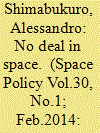

|
|
|
|
|
| Publication |
2014.
|
| Summary/Abstract |
Space systems are essential to the global economy and security. The possibility of disruptions arising from competition between the United States and China through the testing and deployment of weapons in space has led to concerns over an incipient space arms race that would threaten satellites, leading to international calls for a space arms control treaty. The paper presents a rationalist theory analysis on the lack of progress in establishing such a treaty, identifying the United States' position of primacy in the global order and its preeminence in space as a primary cause.
|
|
|
|
|
|
|
|
|
|
|
|
|
|
|
|
| 6 |
ID:
142100
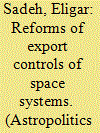

|
|
|
|
|
| Summary/Abstract |
This report on Reforms of Export Controls of Space Systems is based on meetings and interviews held in December 2014 with the U.S. Department of Commerce and the Bureau of Industry and Security (BIS) and the Office of National Security and Technology Transfers Controls therein. This was held on the basis of non-attribution to any of the individuals involved from the Department of Commerce, and the conclusions highlighted in the following are solely the views and interpretations of Eligar Sadeh.
|
|
|
|
|
|
|
|
|
|
|
|
|
|
|
|
| 7 |
ID:
138804
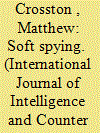

|
|
|
|
|
| Summary/Abstract |
Despite Hollywood romanticizing about the fictional escapades of various James Bonds and Jason Bournes, one of the most prevalent forms of modern intelligence activity is arguably the least emphasized: economic and industrial espionage. Aimed at garnering financial and innovation advantages for countries seeking greater influence in a highly globalized world, this activity is not merely about economic policy. It also serves as a de facto proxy military rivalry: states maneuver to outperform, outwit, and “outstrategize” their competitors across all spheres of profitable activity via this lesser “INT.” Like the more ubiquitous concept of soft power, soft spying (a term interchangeable with “economic and/or industrial espionage”) is the avoidance of war while still achieving dominance, wherein states engage one another in myriad transactions and contestations, and global futures can rise or fall without a single bullet being fired. Soft spying is an under-emphasized aspect of globalization and the ever-increasing transnational technical connectivity among nations. More importantly for Americans, structural/cultural flaws in the world of business reveal how the United States might arguably always end up more victim than perpetrator in this globally pervasive activity.
|
|
|
|
|
|
|
|
|
|
|
|
|
|
|
|
| 8 |
ID:
071028
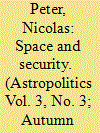

|
|
|
|
|
| Publication |
2005.
|
| Summary/Abstract |
Space systems have grown increasingly integral to the United States' national security in the post-Cold War era. The diplomatic and military leverage that space capabilities can provide is not going unnoticed by other countries. Since the collapse of the USSR, the United States has enjoyed a near-absolute dominance in space activities. Only the civilian European space program has mounted any sort of technical challenge to the United States, with little interest devoted to space military activities, but the period of US hegemony in the space military domain might come to an end. In recent years the European Union (EU) and its member states have taken numerous steps towards designing and assembling a Common Foreign and Security Policy and a coherent European Security and Defence Policy. Furthermore, several important steps toward linking security needs and space capabilities have been taken by the tandem European Union-European Space Agency and other relevant institutions. Space is now seen as an essential asset for European integration and for non-dependence in the current geo-strategic context, since space-based systems and derived information can bring necessary capabilities for autonomous decision making. The development of an integrated European space capability for security is at an early stage, but it is an ongoing process presenting some opportunities to enhance European independence and security.
|
|
|
|
|
|
|
|
|
|
|
|
|
|
|
|
| 9 |
ID:
142098
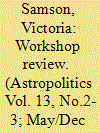

|
|
|
|
|
| Summary/Abstract |
Experts from U.S. government agencies that administer export controls of space systems and representatives from non-governmental organizations and think tanks were invited in December 2014 to participate in an invitation-only workshop co-hosted by the Secure World Foundation and Astroconsulting International to discuss export controls with a delegation of industry representatives from The Society of Japanese Aerospace Companies. The underlying question when working on export controls is, with the increased access to space and burgeoning role of the private sector in space, how do you regulate this and encourage industry without harming national security? It is difficult to do this while supporting the space industrial base, as export control is perceived as a necessary part of shoring U.S. national security and assuring a stable and predictable space environment. A serious challenge is determining which technologies should be controlled: where do you draw the line? This is particularly the case for space technologies, many of which are dual-use. Countries also have to be careful of unintended consequences. Export control restrictions are extremely challenging to get “just right” and, as a result, should be undertaken only after a considerable amount of discussion with all stakeholders, including input from industry, and when the government has a solid understanding of what it is trying to accomplish via export control protections. Otherwise, the domestic industry can unduly suffer with very little benefit to national security.
|
|
|
|
|
|
|
|
|
|
|
|
|
|
|
|
| 10 |
ID:
142099
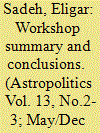

|
|
|
|
|
| Summary/Abstract |
This report is a follow-up to the previous review of the workshop on export controls of space systems. The focus is on key points put forward at the workshop and concluding observations.
|
|
|
|
|
|
|
|
|
|
|
|
|
|
|
|